Legal Aspects of Business: Corporate Separate Personality and Agency
VerifiedAdded on 2023/01/09
|9
|2963
|27
Report
AI Summary
This report provides a comprehensive analysis of key legal aspects of business, focusing on the principles of corporate separate personality and the concept of limited liability companies (LLCs) within the UK context. It critically discusses the advantages and disadvantages of corporate separate personality, emphasizing its role in protecting individuals from liability and its implications for business operations. The Salmon vs. Salmon case is analyzed to illustrate the practical application of these principles. Furthermore, the report examines the advantages and disadvantages of LLCs, including tax benefits, flexibility, and potential challenges in raising funds and transferring ownership. It also explores the general and fiduciary duties of an agent, as outlined in the Companies Act 2006, including the duties of care, skill, and avoiding conflicts of interest. The process of incorporation is briefly outlined, highlighting the legal requirements for establishing a business entity. This report serves as a valuable resource for understanding the legal frameworks governing business operations and the responsibilities of agents and directors.
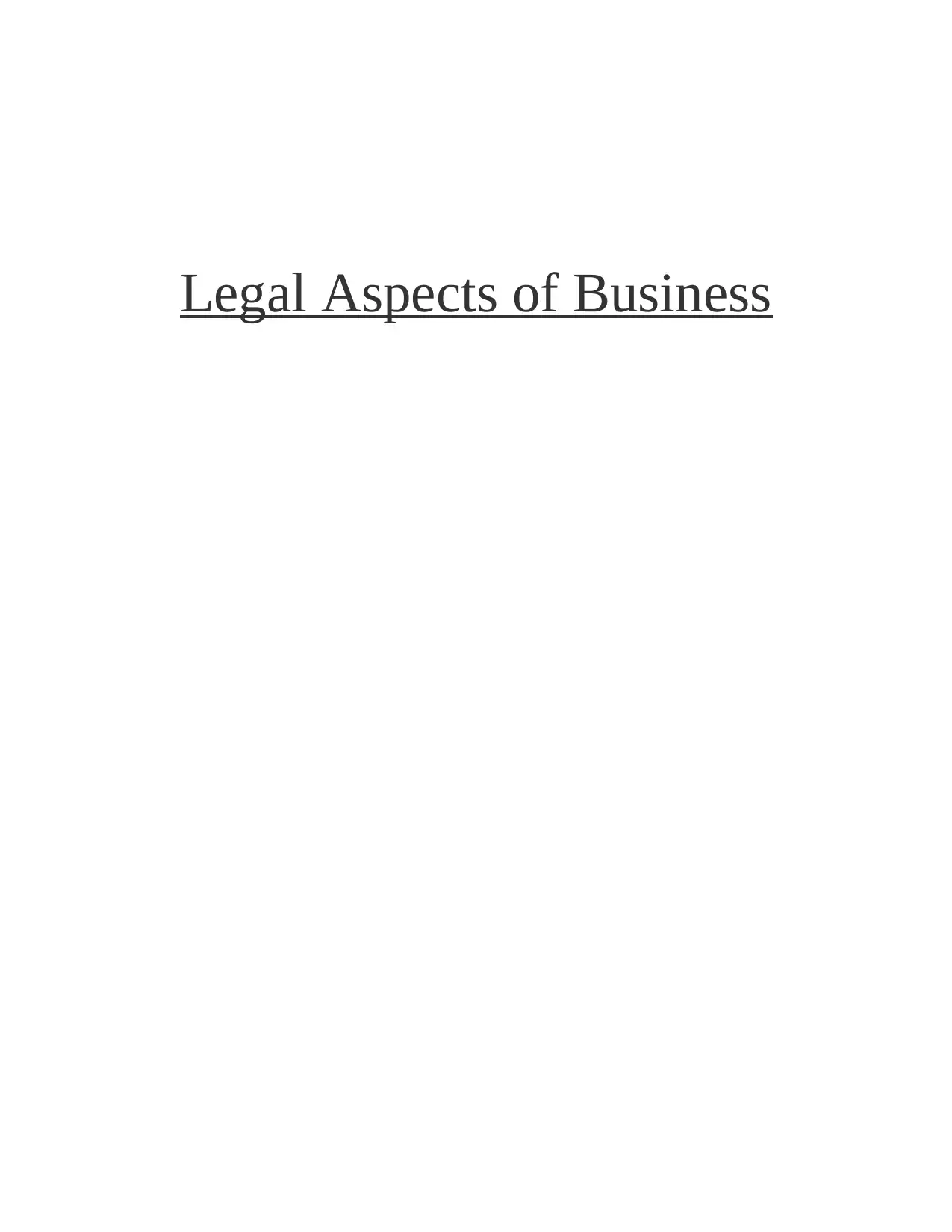
Legal Aspects of Business
Paraphrase This Document
Need a fresh take? Get an instant paraphrase of this document with our AI Paraphraser
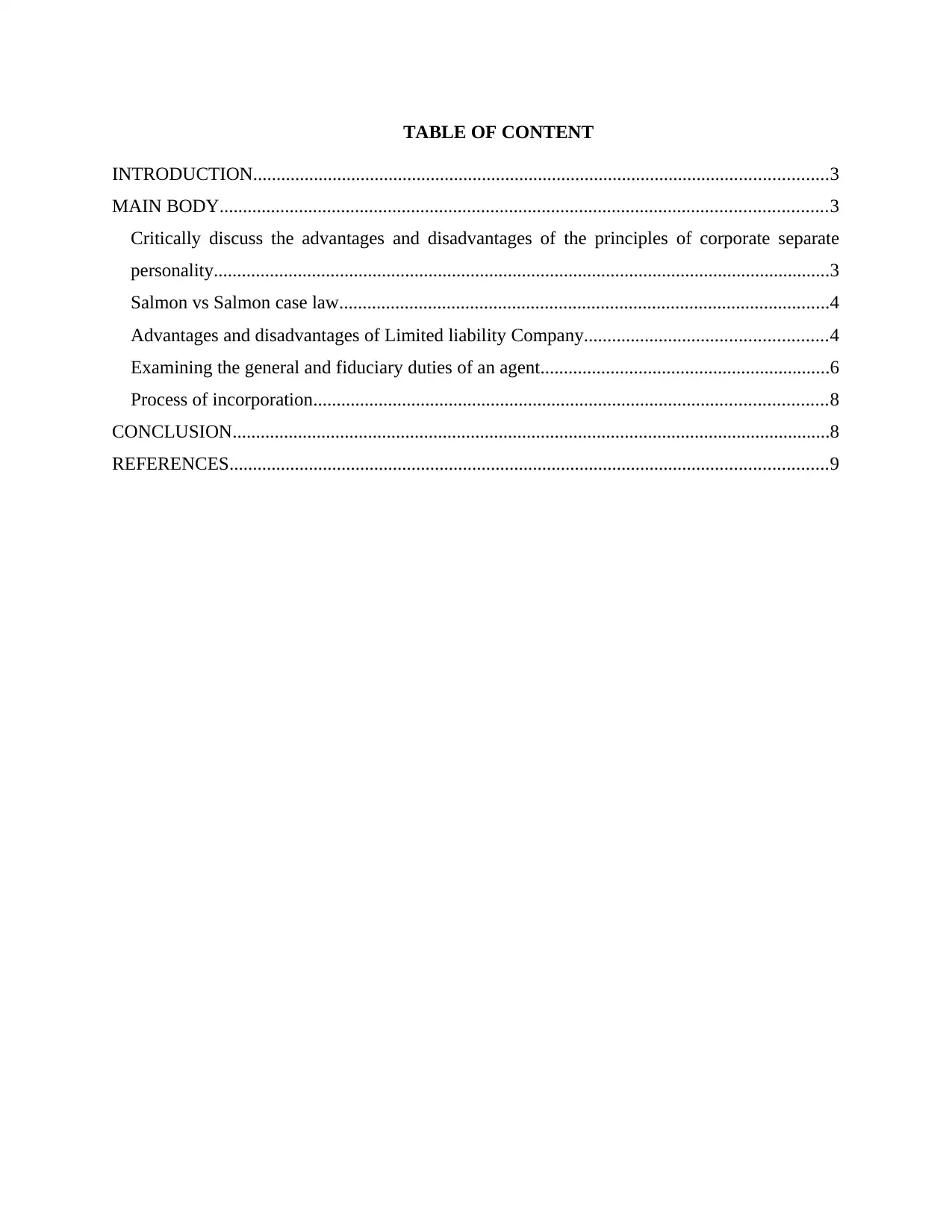
TABLE OF CONTENT
INTRODUCTION...........................................................................................................................3
MAIN BODY..................................................................................................................................3
Critically discuss the advantages and disadvantages of the principles of corporate separate
personality....................................................................................................................................3
Salmon vs Salmon case law.........................................................................................................4
Advantages and disadvantages of Limited liability Company....................................................4
Examining the general and fiduciary duties of an agent..............................................................6
Process of incorporation..............................................................................................................8
CONCLUSION................................................................................................................................8
REFERENCES................................................................................................................................9
INTRODUCTION...........................................................................................................................3
MAIN BODY..................................................................................................................................3
Critically discuss the advantages and disadvantages of the principles of corporate separate
personality....................................................................................................................................3
Salmon vs Salmon case law.........................................................................................................4
Advantages and disadvantages of Limited liability Company....................................................4
Examining the general and fiduciary duties of an agent..............................................................6
Process of incorporation..............................................................................................................8
CONCLUSION................................................................................................................................8
REFERENCES................................................................................................................................9
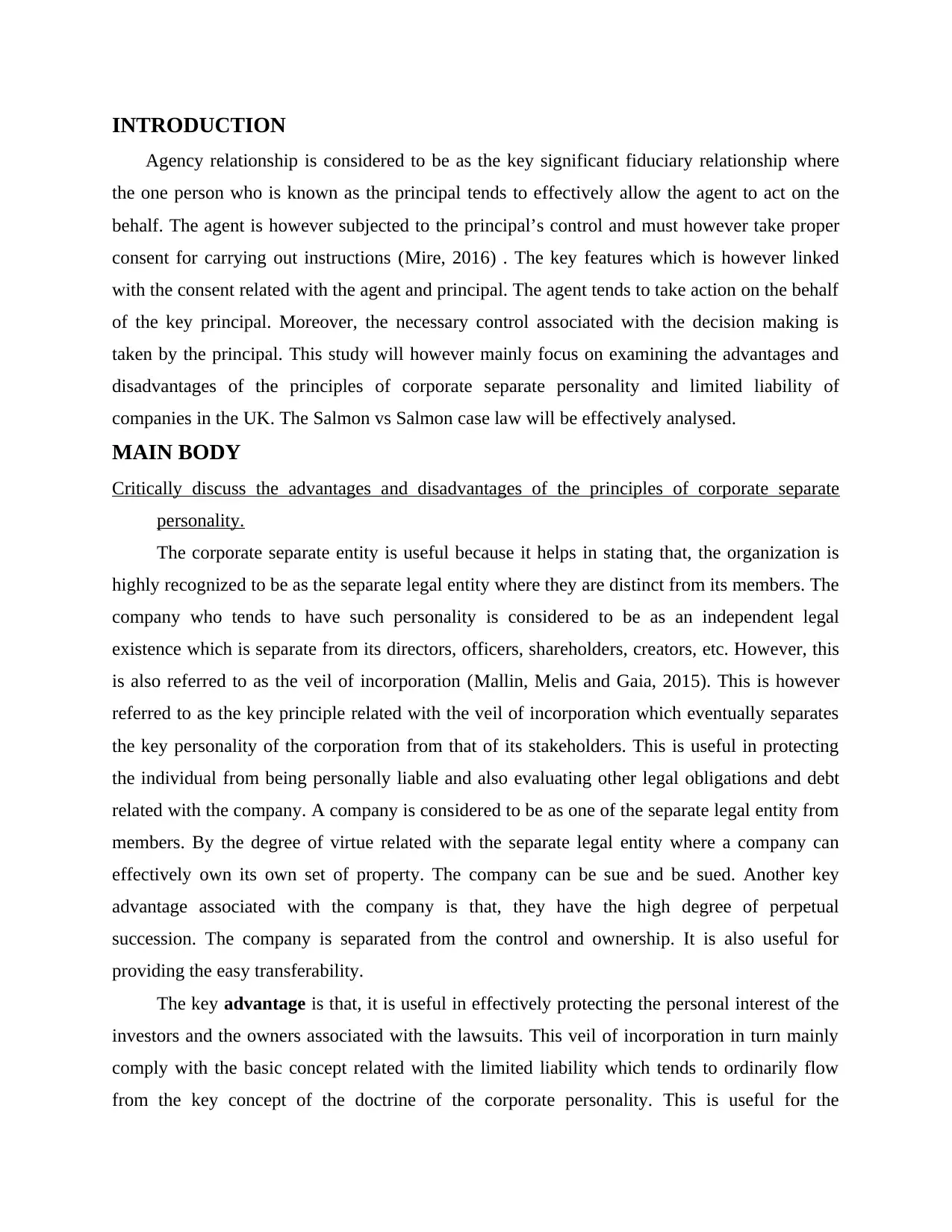
INTRODUCTION
Agency relationship is considered to be as the key significant fiduciary relationship where
the one person who is known as the principal tends to effectively allow the agent to act on the
behalf. The agent is however subjected to the principal’s control and must however take proper
consent for carrying out instructions (Mire, 2016) . The key features which is however linked
with the consent related with the agent and principal. The agent tends to take action on the behalf
of the key principal. Moreover, the necessary control associated with the decision making is
taken by the principal. This study will however mainly focus on examining the advantages and
disadvantages of the principles of corporate separate personality and limited liability of
companies in the UK. The Salmon vs Salmon case law will be effectively analysed.
MAIN BODY
Critically discuss the advantages and disadvantages of the principles of corporate separate
personality.
The corporate separate entity is useful because it helps in stating that, the organization is
highly recognized to be as the separate legal entity where they are distinct from its members. The
company who tends to have such personality is considered to be as an independent legal
existence which is separate from its directors, officers, shareholders, creators, etc. However, this
is also referred to as the veil of incorporation (Mallin, Melis and Gaia, 2015). This is however
referred to as the key principle related with the veil of incorporation which eventually separates
the key personality of the corporation from that of its stakeholders. This is useful in protecting
the individual from being personally liable and also evaluating other legal obligations and debt
related with the company. A company is considered to be as one of the separate legal entity from
members. By the degree of virtue related with the separate legal entity where a company can
effectively own its own set of property. The company can be sue and be sued. Another key
advantage associated with the company is that, they have the high degree of perpetual
succession. The company is separated from the control and ownership. It is also useful for
providing the easy transferability.
The key advantage is that, it is useful in effectively protecting the personal interest of the
investors and the owners associated with the lawsuits. This veil of incorporation in turn mainly
comply with the basic concept related with the limited liability which tends to ordinarily flow
from the key concept of the doctrine of the corporate personality. This is useful for the
Agency relationship is considered to be as the key significant fiduciary relationship where
the one person who is known as the principal tends to effectively allow the agent to act on the
behalf. The agent is however subjected to the principal’s control and must however take proper
consent for carrying out instructions (Mire, 2016) . The key features which is however linked
with the consent related with the agent and principal. The agent tends to take action on the behalf
of the key principal. Moreover, the necessary control associated with the decision making is
taken by the principal. This study will however mainly focus on examining the advantages and
disadvantages of the principles of corporate separate personality and limited liability of
companies in the UK. The Salmon vs Salmon case law will be effectively analysed.
MAIN BODY
Critically discuss the advantages and disadvantages of the principles of corporate separate
personality.
The corporate separate entity is useful because it helps in stating that, the organization is
highly recognized to be as the separate legal entity where they are distinct from its members. The
company who tends to have such personality is considered to be as an independent legal
existence which is separate from its directors, officers, shareholders, creators, etc. However, this
is also referred to as the veil of incorporation (Mallin, Melis and Gaia, 2015). This is however
referred to as the key principle related with the veil of incorporation which eventually separates
the key personality of the corporation from that of its stakeholders. This is useful in protecting
the individual from being personally liable and also evaluating other legal obligations and debt
related with the company. A company is considered to be as one of the separate legal entity from
members. By the degree of virtue related with the separate legal entity where a company can
effectively own its own set of property. The company can be sue and be sued. Another key
advantage associated with the company is that, they have the high degree of perpetual
succession. The company is separated from the control and ownership. It is also useful for
providing the easy transferability.
The key advantage is that, it is useful in effectively protecting the personal interest of the
investors and the owners associated with the lawsuits. This veil of incorporation in turn mainly
comply with the basic concept related with the limited liability which tends to ordinarily flow
from the key concept of the doctrine of the corporate personality. This is useful for the
⊘ This is a preview!⊘
Do you want full access?
Subscribe today to unlock all pages.

Trusted by 1+ million students worldwide
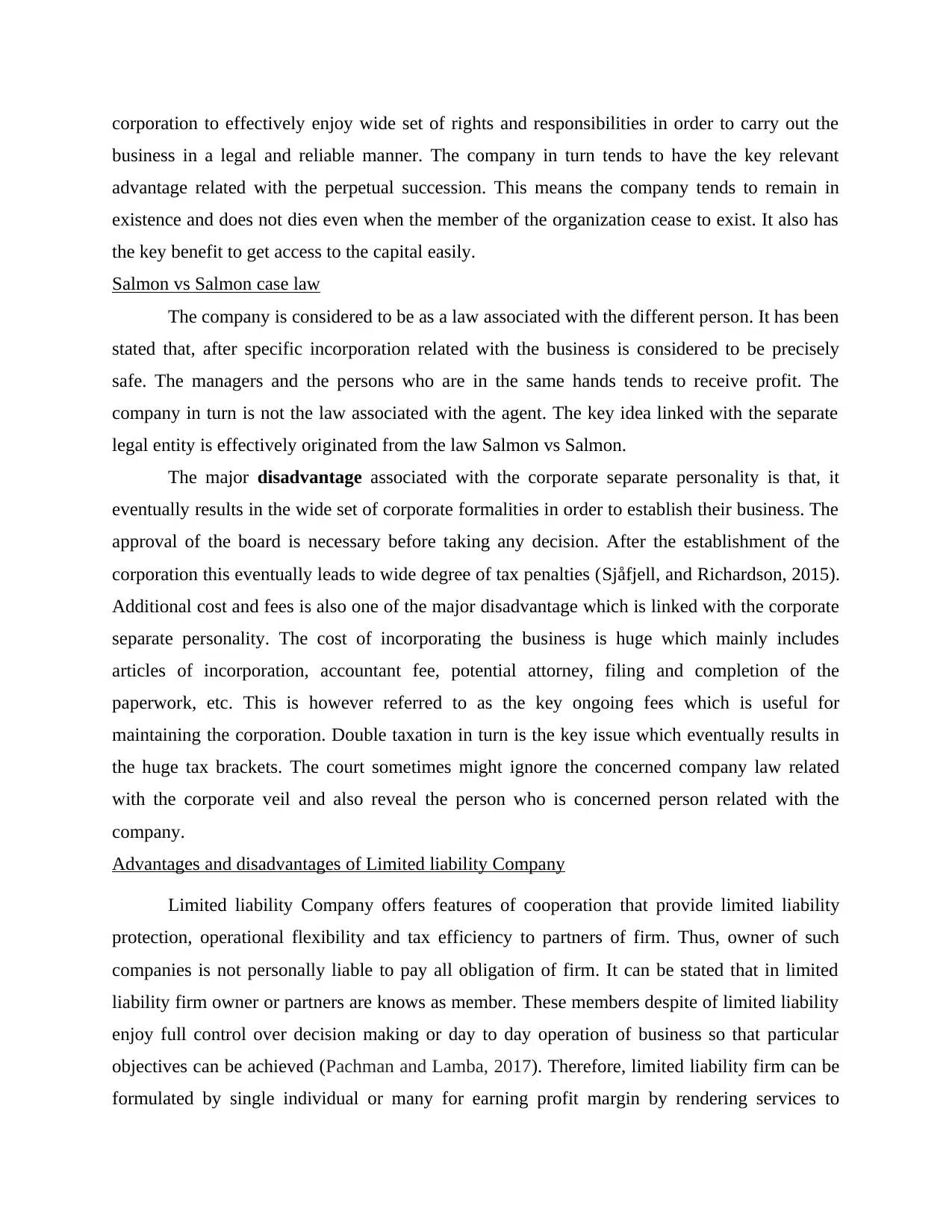
corporation to effectively enjoy wide set of rights and responsibilities in order to carry out the
business in a legal and reliable manner. The company in turn tends to have the key relevant
advantage related with the perpetual succession. This means the company tends to remain in
existence and does not dies even when the member of the organization cease to exist. It also has
the key benefit to get access to the capital easily.
Salmon vs Salmon case law
The company is considered to be as a law associated with the different person. It has been
stated that, after specific incorporation related with the business is considered to be precisely
safe. The managers and the persons who are in the same hands tends to receive profit. The
company in turn is not the law associated with the agent. The key idea linked with the separate
legal entity is effectively originated from the law Salmon vs Salmon.
The major disadvantage associated with the corporate separate personality is that, it
eventually results in the wide set of corporate formalities in order to establish their business. The
approval of the board is necessary before taking any decision. After the establishment of the
corporation this eventually leads to wide degree of tax penalties (Sjåfjell, and Richardson, 2015).
Additional cost and fees is also one of the major disadvantage which is linked with the corporate
separate personality. The cost of incorporating the business is huge which mainly includes
articles of incorporation, accountant fee, potential attorney, filing and completion of the
paperwork, etc. This is however referred to as the key ongoing fees which is useful for
maintaining the corporation. Double taxation in turn is the key issue which eventually results in
the huge tax brackets. The court sometimes might ignore the concerned company law related
with the corporate veil and also reveal the person who is concerned person related with the
company.
Advantages and disadvantages of Limited liability Company
Limited liability Company offers features of cooperation that provide limited liability
protection, operational flexibility and tax efficiency to partners of firm. Thus, owner of such
companies is not personally liable to pay all obligation of firm. It can be stated that in limited
liability firm owner or partners are knows as member. These members despite of limited liability
enjoy full control over decision making or day to day operation of business so that particular
objectives can be achieved (Pachman and Lamba, 2017). Therefore, limited liability firm can be
formulated by single individual or many for earning profit margin by rendering services to
business in a legal and reliable manner. The company in turn tends to have the key relevant
advantage related with the perpetual succession. This means the company tends to remain in
existence and does not dies even when the member of the organization cease to exist. It also has
the key benefit to get access to the capital easily.
Salmon vs Salmon case law
The company is considered to be as a law associated with the different person. It has been
stated that, after specific incorporation related with the business is considered to be precisely
safe. The managers and the persons who are in the same hands tends to receive profit. The
company in turn is not the law associated with the agent. The key idea linked with the separate
legal entity is effectively originated from the law Salmon vs Salmon.
The major disadvantage associated with the corporate separate personality is that, it
eventually results in the wide set of corporate formalities in order to establish their business. The
approval of the board is necessary before taking any decision. After the establishment of the
corporation this eventually leads to wide degree of tax penalties (Sjåfjell, and Richardson, 2015).
Additional cost and fees is also one of the major disadvantage which is linked with the corporate
separate personality. The cost of incorporating the business is huge which mainly includes
articles of incorporation, accountant fee, potential attorney, filing and completion of the
paperwork, etc. This is however referred to as the key ongoing fees which is useful for
maintaining the corporation. Double taxation in turn is the key issue which eventually results in
the huge tax brackets. The court sometimes might ignore the concerned company law related
with the corporate veil and also reveal the person who is concerned person related with the
company.
Advantages and disadvantages of Limited liability Company
Limited liability Company offers features of cooperation that provide limited liability
protection, operational flexibility and tax efficiency to partners of firm. Thus, owner of such
companies is not personally liable to pay all obligation of firm. It can be stated that in limited
liability firm owner or partners are knows as member. These members despite of limited liability
enjoy full control over decision making or day to day operation of business so that particular
objectives can be achieved (Pachman and Lamba, 2017). Therefore, limited liability firm can be
formulated by single individual or many for earning profit margin by rendering services to
Paraphrase This Document
Need a fresh take? Get an instant paraphrase of this document with our AI Paraphraser
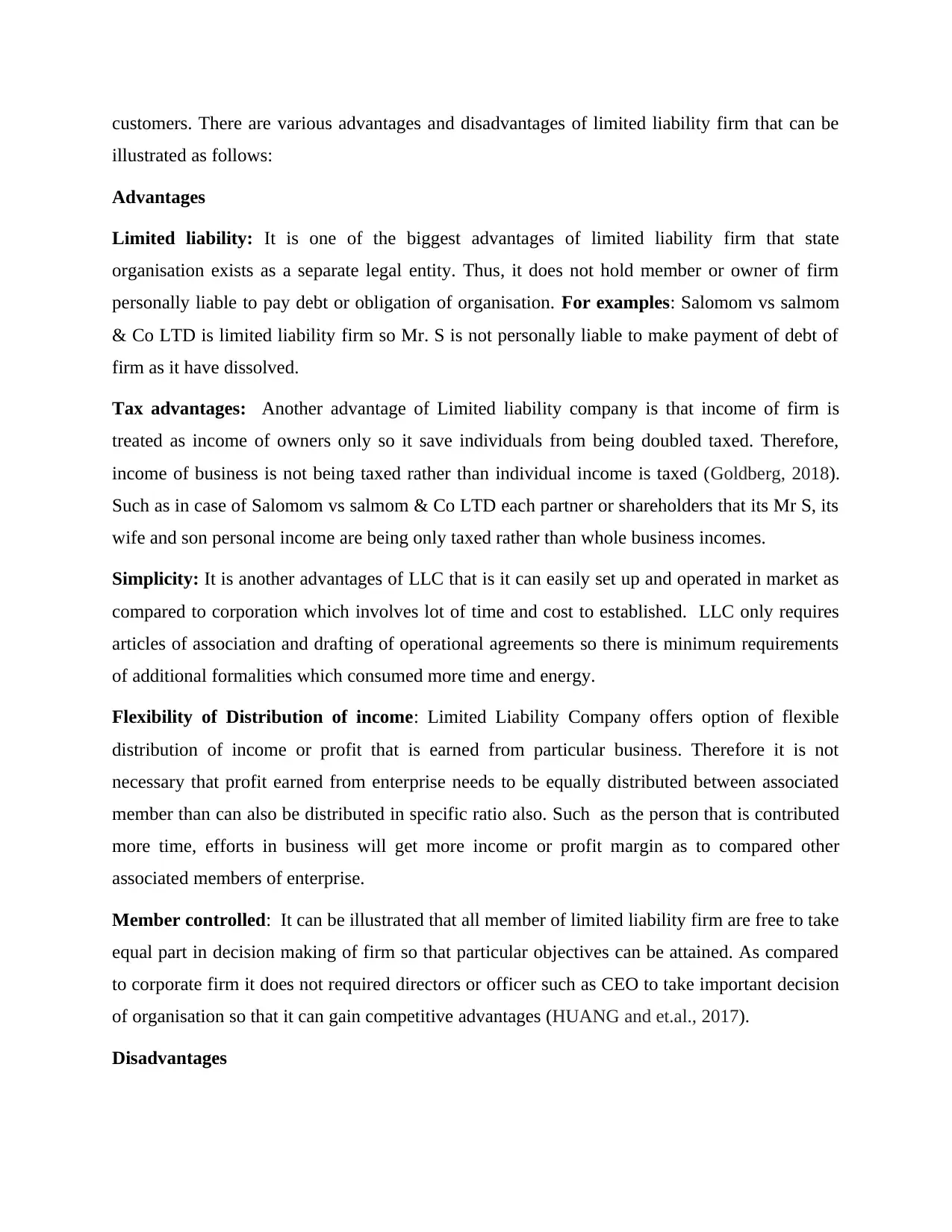
customers. There are various advantages and disadvantages of limited liability firm that can be
illustrated as follows:
Advantages
Limited liability: It is one of the biggest advantages of limited liability firm that state
organisation exists as a separate legal entity. Thus, it does not hold member or owner of firm
personally liable to pay debt or obligation of organisation. For examples: Salomom vs salmom
& Co LTD is limited liability firm so Mr. S is not personally liable to make payment of debt of
firm as it have dissolved.
Tax advantages: Another advantage of Limited liability company is that income of firm is
treated as income of owners only so it save individuals from being doubled taxed. Therefore,
income of business is not being taxed rather than individual income is taxed (Goldberg, 2018).
Such as in case of Salomom vs salmom & Co LTD each partner or shareholders that its Mr S, its
wife and son personal income are being only taxed rather than whole business incomes.
Simplicity: It is another advantages of LLC that is it can easily set up and operated in market as
compared to corporation which involves lot of time and cost to established. LLC only requires
articles of association and drafting of operational agreements so there is minimum requirements
of additional formalities which consumed more time and energy.
Flexibility of Distribution of income: Limited Liability Company offers option of flexible
distribution of income or profit that is earned from particular business. Therefore it is not
necessary that profit earned from enterprise needs to be equally distributed between associated
member than can also be distributed in specific ratio also. Such as the person that is contributed
more time, efforts in business will get more income or profit margin as to compared other
associated members of enterprise.
Member controlled: It can be illustrated that all member of limited liability firm are free to take
equal part in decision making of firm so that particular objectives can be attained. As compared
to corporate firm it does not required directors or officer such as CEO to take important decision
of organisation so that it can gain competitive advantages (HUANG and et.al., 2017).
Disadvantages
illustrated as follows:
Advantages
Limited liability: It is one of the biggest advantages of limited liability firm that state
organisation exists as a separate legal entity. Thus, it does not hold member or owner of firm
personally liable to pay debt or obligation of organisation. For examples: Salomom vs salmom
& Co LTD is limited liability firm so Mr. S is not personally liable to make payment of debt of
firm as it have dissolved.
Tax advantages: Another advantage of Limited liability company is that income of firm is
treated as income of owners only so it save individuals from being doubled taxed. Therefore,
income of business is not being taxed rather than individual income is taxed (Goldberg, 2018).
Such as in case of Salomom vs salmom & Co LTD each partner or shareholders that its Mr S, its
wife and son personal income are being only taxed rather than whole business incomes.
Simplicity: It is another advantages of LLC that is it can easily set up and operated in market as
compared to corporation which involves lot of time and cost to established. LLC only requires
articles of association and drafting of operational agreements so there is minimum requirements
of additional formalities which consumed more time and energy.
Flexibility of Distribution of income: Limited Liability Company offers option of flexible
distribution of income or profit that is earned from particular business. Therefore it is not
necessary that profit earned from enterprise needs to be equally distributed between associated
member than can also be distributed in specific ratio also. Such as the person that is contributed
more time, efforts in business will get more income or profit margin as to compared other
associated members of enterprise.
Member controlled: It can be illustrated that all member of limited liability firm are free to take
equal part in decision making of firm so that particular objectives can be attained. As compared
to corporate firm it does not required directors or officer such as CEO to take important decision
of organisation so that it can gain competitive advantages (HUANG and et.al., 2017).
Disadvantages
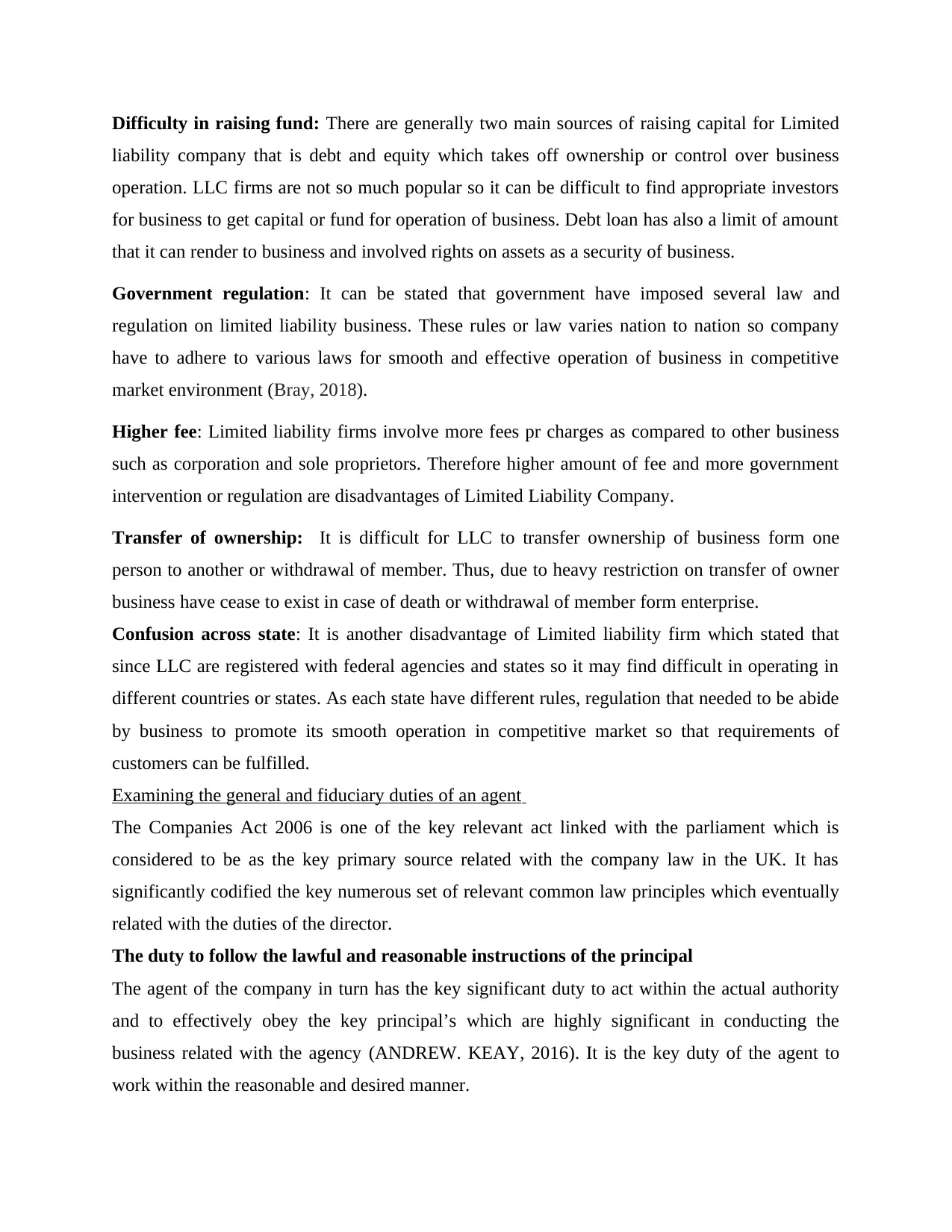
Difficulty in raising fund: There are generally two main sources of raising capital for Limited
liability company that is debt and equity which takes off ownership or control over business
operation. LLC firms are not so much popular so it can be difficult to find appropriate investors
for business to get capital or fund for operation of business. Debt loan has also a limit of amount
that it can render to business and involved rights on assets as a security of business.
Government regulation: It can be stated that government have imposed several law and
regulation on limited liability business. These rules or law varies nation to nation so company
have to adhere to various laws for smooth and effective operation of business in competitive
market environment (Bray, 2018).
Higher fee: Limited liability firms involve more fees pr charges as compared to other business
such as corporation and sole proprietors. Therefore higher amount of fee and more government
intervention or regulation are disadvantages of Limited Liability Company.
Transfer of ownership: It is difficult for LLC to transfer ownership of business form one
person to another or withdrawal of member. Thus, due to heavy restriction on transfer of owner
business have cease to exist in case of death or withdrawal of member form enterprise.
Confusion across state: It is another disadvantage of Limited liability firm which stated that
since LLC are registered with federal agencies and states so it may find difficult in operating in
different countries or states. As each state have different rules, regulation that needed to be abide
by business to promote its smooth operation in competitive market so that requirements of
customers can be fulfilled.
Examining the general and fiduciary duties of an agent
The Companies Act 2006 is one of the key relevant act linked with the parliament which is
considered to be as the key primary source related with the company law in the UK. It has
significantly codified the key numerous set of relevant common law principles which eventually
related with the duties of the director.
The duty to follow the lawful and reasonable instructions of the principal
The agent of the company in turn has the key significant duty to act within the actual authority
and to effectively obey the key principal’s which are highly significant in conducting the
business related with the agency (ANDREW. KEAY, 2016). It is the key duty of the agent to
work within the reasonable and desired manner.
liability company that is debt and equity which takes off ownership or control over business
operation. LLC firms are not so much popular so it can be difficult to find appropriate investors
for business to get capital or fund for operation of business. Debt loan has also a limit of amount
that it can render to business and involved rights on assets as a security of business.
Government regulation: It can be stated that government have imposed several law and
regulation on limited liability business. These rules or law varies nation to nation so company
have to adhere to various laws for smooth and effective operation of business in competitive
market environment (Bray, 2018).
Higher fee: Limited liability firms involve more fees pr charges as compared to other business
such as corporation and sole proprietors. Therefore higher amount of fee and more government
intervention or regulation are disadvantages of Limited Liability Company.
Transfer of ownership: It is difficult for LLC to transfer ownership of business form one
person to another or withdrawal of member. Thus, due to heavy restriction on transfer of owner
business have cease to exist in case of death or withdrawal of member form enterprise.
Confusion across state: It is another disadvantage of Limited liability firm which stated that
since LLC are registered with federal agencies and states so it may find difficult in operating in
different countries or states. As each state have different rules, regulation that needed to be abide
by business to promote its smooth operation in competitive market so that requirements of
customers can be fulfilled.
Examining the general and fiduciary duties of an agent
The Companies Act 2006 is one of the key relevant act linked with the parliament which is
considered to be as the key primary source related with the company law in the UK. It has
significantly codified the key numerous set of relevant common law principles which eventually
related with the duties of the director.
The duty to follow the lawful and reasonable instructions of the principal
The agent of the company in turn has the key significant duty to act within the actual authority
and to effectively obey the key principal’s which are highly significant in conducting the
business related with the agency (ANDREW. KEAY, 2016). It is the key duty of the agent to
work within the reasonable and desired manner.
⊘ This is a preview!⊘
Do you want full access?
Subscribe today to unlock all pages.

Trusted by 1+ million students worldwide
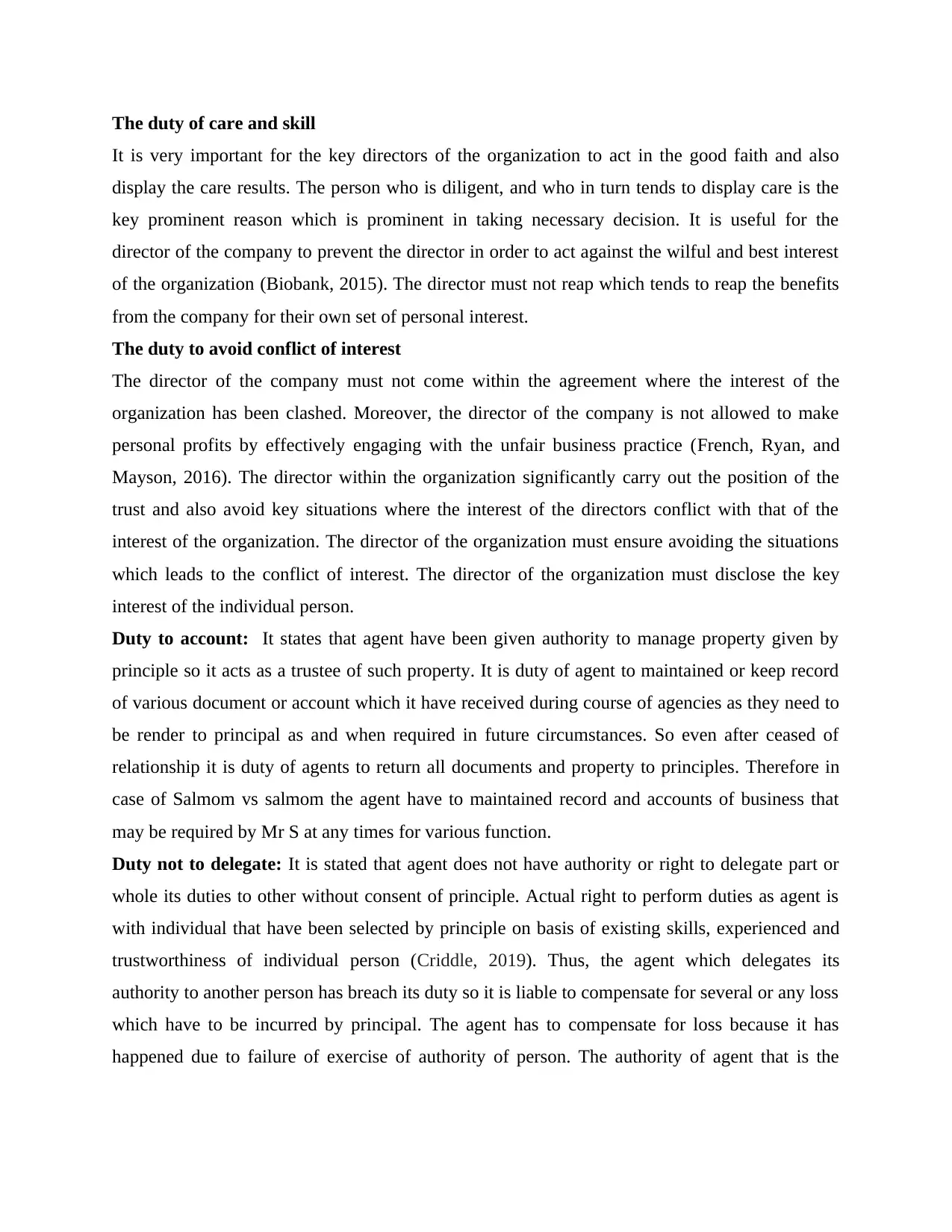
The duty of care and skill
It is very important for the key directors of the organization to act in the good faith and also
display the care results. The person who is diligent, and who in turn tends to display care is the
key prominent reason which is prominent in taking necessary decision. It is useful for the
director of the company to prevent the director in order to act against the wilful and best interest
of the organization (Biobank, 2015). The director must not reap which tends to reap the benefits
from the company for their own set of personal interest.
The duty to avoid conflict of interest
The director of the company must not come within the agreement where the interest of the
organization has been clashed. Moreover, the director of the company is not allowed to make
personal profits by effectively engaging with the unfair business practice (French, Ryan, and
Mayson, 2016). The director within the organization significantly carry out the position of the
trust and also avoid key situations where the interest of the directors conflict with that of the
interest of the organization. The director of the organization must ensure avoiding the situations
which leads to the conflict of interest. The director of the organization must disclose the key
interest of the individual person.
Duty to account: It states that agent have been given authority to manage property given by
principle so it acts as a trustee of such property. It is duty of agent to maintained or keep record
of various document or account which it have received during course of agencies as they need to
be render to principal as and when required in future circumstances. So even after ceased of
relationship it is duty of agents to return all documents and property to principles. Therefore in
case of Salmom vs salmom the agent have to maintained record and accounts of business that
may be required by Mr S at any times for various function.
Duty not to delegate: It is stated that agent does not have authority or right to delegate part or
whole its duties to other without consent of principle. Actual right to perform duties as agent is
with individual that have been selected by principle on basis of existing skills, experienced and
trustworthiness of individual person (Criddle, 2019). Thus, the agent which delegates its
authority to another person has breach its duty so it is liable to compensate for several or any loss
which have to be incurred by principal. The agent has to compensate for loss because it has
happened due to failure of exercise of authority of person. The authority of agent that is the
It is very important for the key directors of the organization to act in the good faith and also
display the care results. The person who is diligent, and who in turn tends to display care is the
key prominent reason which is prominent in taking necessary decision. It is useful for the
director of the company to prevent the director in order to act against the wilful and best interest
of the organization (Biobank, 2015). The director must not reap which tends to reap the benefits
from the company for their own set of personal interest.
The duty to avoid conflict of interest
The director of the company must not come within the agreement where the interest of the
organization has been clashed. Moreover, the director of the company is not allowed to make
personal profits by effectively engaging with the unfair business practice (French, Ryan, and
Mayson, 2016). The director within the organization significantly carry out the position of the
trust and also avoid key situations where the interest of the directors conflict with that of the
interest of the organization. The director of the organization must ensure avoiding the situations
which leads to the conflict of interest. The director of the organization must disclose the key
interest of the individual person.
Duty to account: It states that agent have been given authority to manage property given by
principle so it acts as a trustee of such property. It is duty of agent to maintained or keep record
of various document or account which it have received during course of agencies as they need to
be render to principal as and when required in future circumstances. So even after ceased of
relationship it is duty of agents to return all documents and property to principles. Therefore in
case of Salmom vs salmom the agent have to maintained record and accounts of business that
may be required by Mr S at any times for various function.
Duty not to delegate: It is stated that agent does not have authority or right to delegate part or
whole its duties to other without consent of principle. Actual right to perform duties as agent is
with individual that have been selected by principle on basis of existing skills, experienced and
trustworthiness of individual person (Criddle, 2019). Thus, the agent which delegates its
authority to another person has breach its duty so it is liable to compensate for several or any loss
which have to be incurred by principal. The agent has to compensate for loss because it has
happened due to failure of exercise of authority of person. The authority of agent that is the
Paraphrase This Document
Need a fresh take? Get an instant paraphrase of this document with our AI Paraphraser
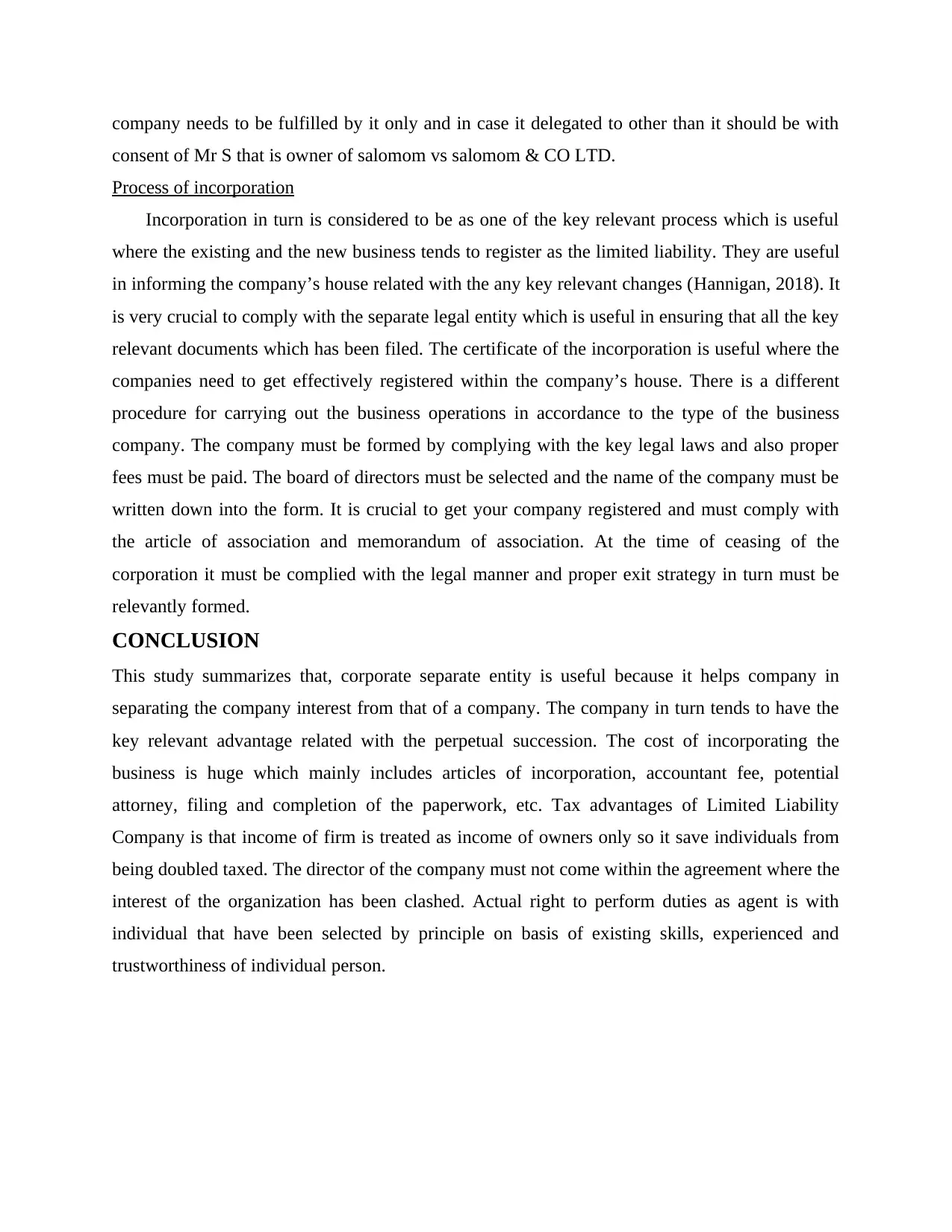
company needs to be fulfilled by it only and in case it delegated to other than it should be with
consent of Mr S that is owner of salomom vs salomom & CO LTD.
Process of incorporation
Incorporation in turn is considered to be as one of the key relevant process which is useful
where the existing and the new business tends to register as the limited liability. They are useful
in informing the company’s house related with the any key relevant changes (Hannigan, 2018). It
is very crucial to comply with the separate legal entity which is useful in ensuring that all the key
relevant documents which has been filed. The certificate of the incorporation is useful where the
companies need to get effectively registered within the company’s house. There is a different
procedure for carrying out the business operations in accordance to the type of the business
company. The company must be formed by complying with the key legal laws and also proper
fees must be paid. The board of directors must be selected and the name of the company must be
written down into the form. It is crucial to get your company registered and must comply with
the article of association and memorandum of association. At the time of ceasing of the
corporation it must be complied with the legal manner and proper exit strategy in turn must be
relevantly formed.
CONCLUSION
This study summarizes that, corporate separate entity is useful because it helps company in
separating the company interest from that of a company. The company in turn tends to have the
key relevant advantage related with the perpetual succession. The cost of incorporating the
business is huge which mainly includes articles of incorporation, accountant fee, potential
attorney, filing and completion of the paperwork, etc. Tax advantages of Limited Liability
Company is that income of firm is treated as income of owners only so it save individuals from
being doubled taxed. The director of the company must not come within the agreement where the
interest of the organization has been clashed. Actual right to perform duties as agent is with
individual that have been selected by principle on basis of existing skills, experienced and
trustworthiness of individual person.
consent of Mr S that is owner of salomom vs salomom & CO LTD.
Process of incorporation
Incorporation in turn is considered to be as one of the key relevant process which is useful
where the existing and the new business tends to register as the limited liability. They are useful
in informing the company’s house related with the any key relevant changes (Hannigan, 2018). It
is very crucial to comply with the separate legal entity which is useful in ensuring that all the key
relevant documents which has been filed. The certificate of the incorporation is useful where the
companies need to get effectively registered within the company’s house. There is a different
procedure for carrying out the business operations in accordance to the type of the business
company. The company must be formed by complying with the key legal laws and also proper
fees must be paid. The board of directors must be selected and the name of the company must be
written down into the form. It is crucial to get your company registered and must comply with
the article of association and memorandum of association. At the time of ceasing of the
corporation it must be complied with the legal manner and proper exit strategy in turn must be
relevantly formed.
CONCLUSION
This study summarizes that, corporate separate entity is useful because it helps company in
separating the company interest from that of a company. The company in turn tends to have the
key relevant advantage related with the perpetual succession. The cost of incorporating the
business is huge which mainly includes articles of incorporation, accountant fee, potential
attorney, filing and completion of the paperwork, etc. Tax advantages of Limited Liability
Company is that income of firm is treated as income of owners only so it save individuals from
being doubled taxed. The director of the company must not come within the agreement where the
interest of the organization has been clashed. Actual right to perform duties as agent is with
individual that have been selected by principle on basis of existing skills, experienced and
trustworthiness of individual person.
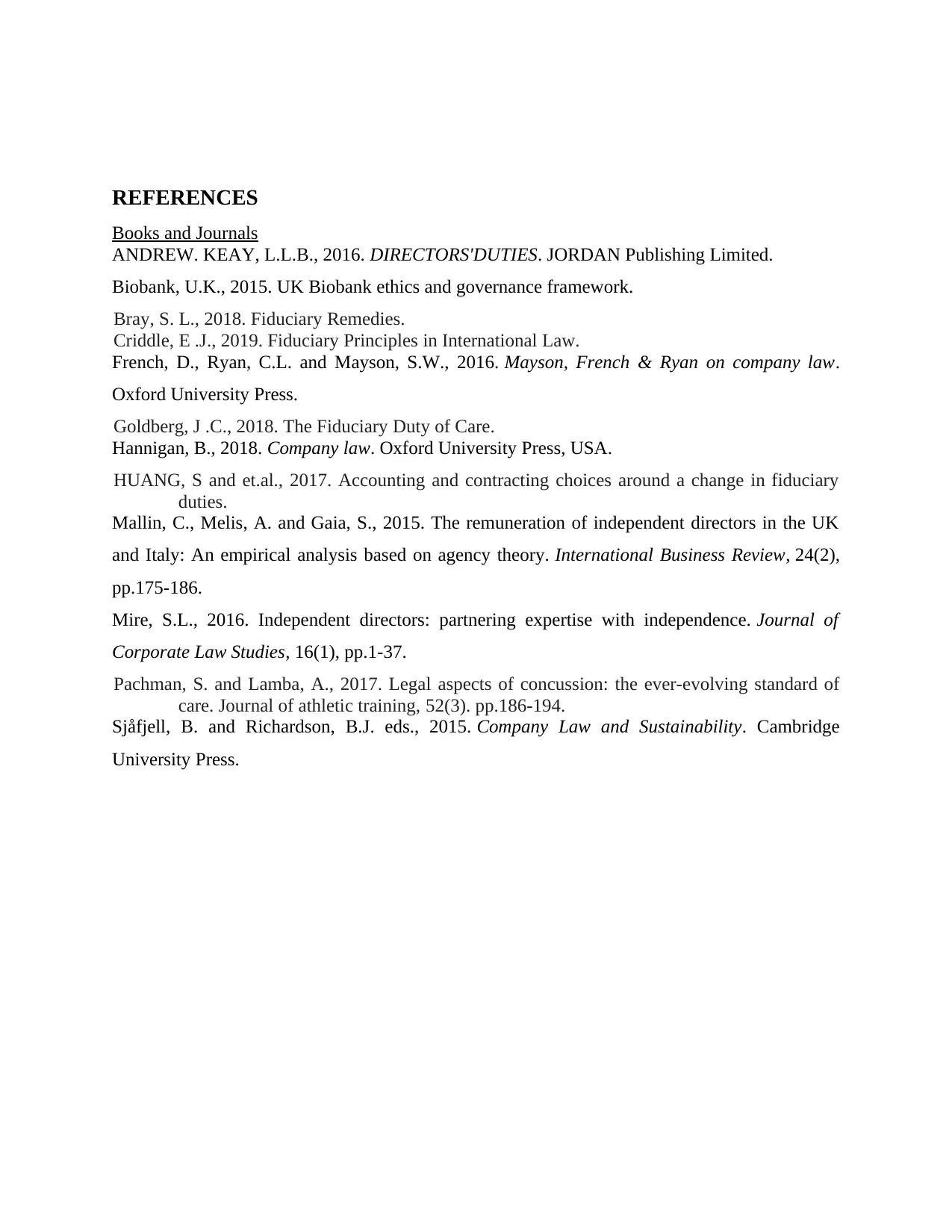
REFERENCES
Books and Journals
ANDREW. KEAY, L.L.B., 2016. DIRECTORS'DUTIES. JORDAN Publishing Limited.
Biobank, U.K., 2015. UK Biobank ethics and governance framework.
Bray, S. L., 2018. Fiduciary Remedies.
Criddle, E .J., 2019. Fiduciary Principles in International Law.
French, D., Ryan, C.L. and Mayson, S.W., 2016. Mayson, French & Ryan on company law.
Oxford University Press.
Goldberg, J .C., 2018. The Fiduciary Duty of Care.
Hannigan, B., 2018. Company law. Oxford University Press, USA.
HUANG, S and et.al., 2017. Accounting and contracting choices around a change in fiduciary
duties.
Mallin, C., Melis, A. and Gaia, S., 2015. The remuneration of independent directors in the UK
and Italy: An empirical analysis based on agency theory. International Business Review, 24(2),
pp.175-186.
Mire, S.L., 2016. Independent directors: partnering expertise with independence. Journal of
Corporate Law Studies, 16(1), pp.1-37.
Pachman, S. and Lamba, A., 2017. Legal aspects of concussion: the ever-evolving standard of
care. Journal of athletic training, 52(3). pp.186-194.
Sjåfjell, B. and Richardson, B.J. eds., 2015. Company Law and Sustainability. Cambridge
University Press.
Books and Journals
ANDREW. KEAY, L.L.B., 2016. DIRECTORS'DUTIES. JORDAN Publishing Limited.
Biobank, U.K., 2015. UK Biobank ethics and governance framework.
Bray, S. L., 2018. Fiduciary Remedies.
Criddle, E .J., 2019. Fiduciary Principles in International Law.
French, D., Ryan, C.L. and Mayson, S.W., 2016. Mayson, French & Ryan on company law.
Oxford University Press.
Goldberg, J .C., 2018. The Fiduciary Duty of Care.
Hannigan, B., 2018. Company law. Oxford University Press, USA.
HUANG, S and et.al., 2017. Accounting and contracting choices around a change in fiduciary
duties.
Mallin, C., Melis, A. and Gaia, S., 2015. The remuneration of independent directors in the UK
and Italy: An empirical analysis based on agency theory. International Business Review, 24(2),
pp.175-186.
Mire, S.L., 2016. Independent directors: partnering expertise with independence. Journal of
Corporate Law Studies, 16(1), pp.1-37.
Pachman, S. and Lamba, A., 2017. Legal aspects of concussion: the ever-evolving standard of
care. Journal of athletic training, 52(3). pp.186-194.
Sjåfjell, B. and Richardson, B.J. eds., 2015. Company Law and Sustainability. Cambridge
University Press.
⊘ This is a preview!⊘
Do you want full access?
Subscribe today to unlock all pages.

Trusted by 1+ million students worldwide
1 out of 9
Related Documents
Your All-in-One AI-Powered Toolkit for Academic Success.
+13062052269
info@desklib.com
Available 24*7 on WhatsApp / Email
![[object Object]](/_next/static/media/star-bottom.7253800d.svg)
Unlock your academic potential
Copyright © 2020–2026 A2Z Services. All Rights Reserved. Developed and managed by ZUCOL.





